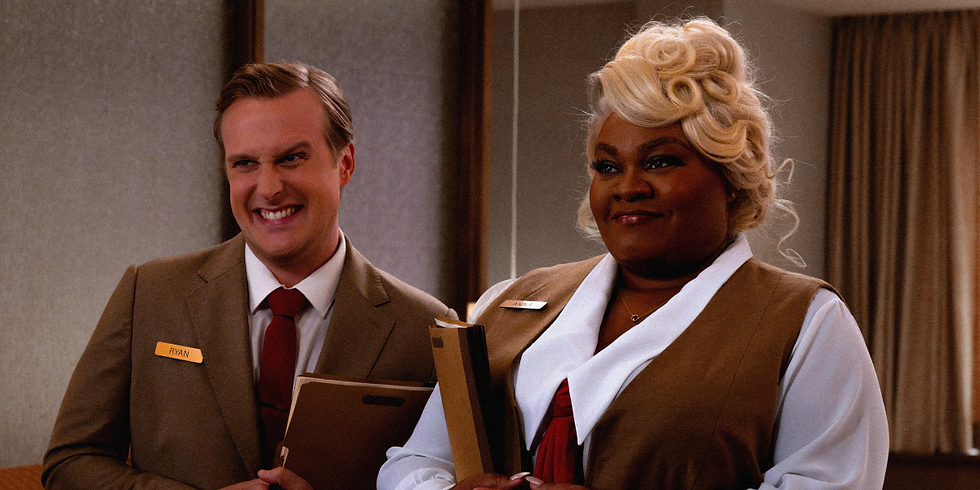Eternity puts a whole new spin on the phrase “Till death do us part.” Like a Pixar movie for adults, the first stage of the afterlife has been literalized as a train junction. The souls of the recently deceased are brought into the hub and are given one week to decide where they would like to spend eternity. Booths line up the halls, each stationed by a tenacious salesperson to persuade souls to come to their unique eternity. One booth is selling Smoker’s World, where everyone is allowed to smoke at all times, and with none of the health risks! Another booth brags about Capitalist World, where you can endure as a hedonistic Wall Street tycoon.
Through the combination of endless options and the threat of eternal permanence, people show their true selves when they enter the afterlife. In the mortal world, restrictions such as geography, financial situations, and societal morals made the hard choices for us. Now the guardrails have been lifted, and it’s time to get serious.
Larry and Joan were one of those couples that could only be separated by death. After sixty years of marriage, they both parted within the span of a week. He accidentally choked on a pretzel at their gender reveal party for their impending grandchild, and she had terminal cancer. It’s not a competition, but I’d say one of them will have a more respectable story to share in the afterlife. When arriving at the junction, your physical form reverts back to when you were happiest, which is where Miles Teller and Elizabeth Olsen come into play. But before they can choose a world, a chaos agent arrives in the form of the irresistibly handsome Callum Turner. He plays Luke, Joan’s first husband, who died in the Korean War. Death parted them, and now the afterlife has brought them back together. He’s been waiting at the junction ever since, and now Joan must choose between a renewed life with him or sticking with Larry.
There isn’t a rule that says Joan has to choose between either of them, but it would be a little awkward for all three to live in the same eternity (although this situation would make them perfect for Soap Opera World). It wouldn’t really matter if there were a hard rule about this sort of thing, as director David Freyne and co-writer Patrick Cunnane keep everything a little vague for its own good. Beach World seemingly only has beaches, and Mountain World seemingly only has mountains. But what about Smoker’s World, or Queer World? Is smoking or being queer the only thing you’re allowed to do there? Nudist World seems pretty normal (sans clothes, of course), and I’d assume a nudist beach would be a popular attraction. The salespeople for each of these worlds talk bout quotas, and unpopular worlds are shut down. If someone developed Everything World, then they’d probably dominate the market share. Right now, I’d pick Golf World, as that’s probably the best chance I have of ever getting a hole-in-one.

It’s not like these gaps are game-breaking. But it was a worrying sign that they were at the top of my mind throughout most of the runtime, instead of the emotional stakes at play. Despite the otherworldly concept, the plot is tied down to our world’s concepts of a love triangle. That means that one side gets the leg up on the other for some time, only for a shocking revelation to tip the scales in the other direction. Freyne’s pacing doesn’t help the matter, with the 112-minute runtime feeling significantly longer than it actually is.
Miles Teller delivers the best performance, channeling the personality of a senior citizen in the body of a young adult. He’s a bit curmudgeonly and always had a bit of resentment over being jokingly referred to as “Joan’s second choice,” but he has a heart of gold and proves that she made the right choice. He also makes the hilarious discovery that his new body allows him to bend over and do squats, something that the mortal world barred him from doing. Olsen and Turner are fine, constantly outshone by Teller and the comedic pair of Da’Vine Joy Randolph and John Early as the deceased trio’s Afterlife Coordinators. Two hours was more than enough time to spend with all these people, much less an eternity.
